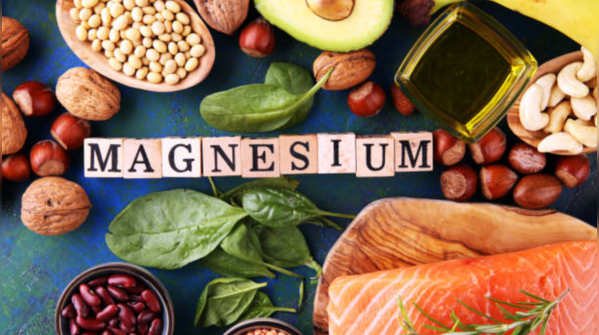
1/9
Magnesium is one of the most underrated minerals of the body
The supplement aisle looks more like a pharmacy-meets-health-food jungle these days. Collagen for skin, ashwagandha for stress, omega-3 for your brain, melatonin for sleep, calcium for bones, B12 for energy… and on and on. But what if there is one humble mineral that could quietly do the job of half your supplement shelf? No, it’s not magic. It’s magnesium. And it just might be the most underrated, under-consumed, and overworked nutrient in your body.
Here’s why magnesium might actually be the only supplement you really need.

2/9
Your body uses it for over 300 processes—seriously
Magnesium isn’t just hanging around for one or two tasks—it’s everywhere. Your body needs it for over 300 biochemical reactions. That includes everything from producing ATP (your body’s energy currency), regulating your heartbeat, supporting muscle and nerve function, managing blood sugar, and even synthesizing DNA.
Most people are so busy chasing “miracle” pills that they forget the basics. But if your magnesium levels are low (and they probably are), those fancy adaptogens and nootropics might not even work properly. It’s like trying to install high-end lighting in a house with faulty wiring.

3/9
It helps you sleep like a baby (without knocking you out)
Melatonin is great and all, but it can leave you feeling groggy or mess with your natural sleep cycle. Enter: magnesium glycinate—a gentle form of magnesium that supports deeper, more restorative sleep by boosting GABA, a neurotransmitter that calms your nervous system.
Unlike melatonin, magnesium doesn’t sedate you—it just helps your body do what it’s already meant to do: fall asleep, stay asleep, and wake up refreshed.
If you’re someone who wakes up at 3 a.m. with racing thoughts, magnesium might be the real hero you’ve been missing. No sleepy-hangover required.

4/9
It’s the chill pill for stress, anxiety, and mood swings
Anxious? Snappy? Feeling like your brain is permanently on overdrive?
Magnesium plays a big role in regulating your nervous system. When you’re stressed, your body burns through magnesium like wildfire. But here’s the plot twist: being low in magnesium can also make you feel more stressed, anxious, and edgy.
That’s because magnesium helps control cortisol, your stress hormone, and keeps the “fight or flight” response in check.
And if you’re someone who gets PMS mood swings, magnesium has also been shown to ease irritability, breast tenderness, and bloating. Think of it as emotional armor in capsule form.

5/9
It keeps you regular (like, really regular)
Let’s talk poop—because no one else will.
If you’re bloated, backed up, or only going every few days, chances are your body is craving magnesium. One of its lesser-known (but totally appreciated) talents is drawing water into your colon, which helps keep things moving along. This is especially true with forms like magnesium citrate or oxide, which are often used to relieve constipation.
Sure, fiber is great, probiotics help—but when it comes to quick relief without becoming dependent, magnesium is the bathroom buddy you never knew you needed.
Bonus? It works without the cramps and urgency that typical laxatives bring. Win-win.

6/9
Your muscles and joints actually love it
You know that annoying eye twitch? The calf cramp at 2 a.m.? The sore neck that lingers for days? Your muscles might be crying out for magnesium.
This mineral helps with muscle contraction, nerve signaling, and inflammation. So when levels are low, you may notice:
Random spasmsSoreness that won’t quitThat feeling of tightness in your neck, shoulders, or back
Magnesium calms things down—literally. It helps muscles relax after they contract, preventing that stuck, tense feeling. It’s also a favorite among athletes for reducing post-workout soreness and improving recovery.
And if you’re dealing with joint pain or chronic inflammation, magnesium helps by modulating inflammatory markers.

7/9
It can boost heart health without the drama
High blood pressure? Racing heart? Palpitations that freak you out? Magnesium helps regulate electrolyte balance, including calcium, potassium, and sodium—three big players in heart rhythm. It also helps relax blood vessels, lowering blood pressure naturally without needing extra meds (in mild cases, of course—always talk to your doctor).
Studies have shown that magnesium intake is linked to a lower risk of heart disease, stroke, and even type 2 diabetes. So if you’re popping CoQ10, garlic pills, and fish oil in the name of heart health, magnesium deserves a front-row seat too.

8/9
It supports blood sugar, hormones, and even migraines
Magnesium doesn’t stop at energy, sleep, and poop. It goes deeper—into blood sugar control, insulin sensitivity, and even hormone balance.
Low magnesium has been linked to insulin resistance, making it harder for your body to handle sugar and carbs. That’s why many people with type 2 diabetes or PCOS are found to be deficient.
Plus, women with hormone imbalances (especially during perimenopause or PMS) often find relief when they add magnesium + B6 to their routine. It helps reduce breast pain, irritability, bloating, and menstrual migraines.
Speaking of migraines—if you’re a chronic sufferer, there’s growing evidence that low magnesium levels may trigger attacks.

9/9
So… is it really the only supplement you need?
Okay, let’s be real: magnesium can’t do everything. If you're vegan, you might still need B12. If you never get sun, vitamin D should probably stay in your routine. And if you have diagnosed deficiencies or specific health conditions, your supplement stack might look different.
But for the average, overwhelmed, tired, bloated, anxious human? Magnesium might be the one supplement that quietly fixes half your complaints.
Follow Us On Social Media

 7 hours ago
43
7 hours ago
43




























 English (US)
English (US)